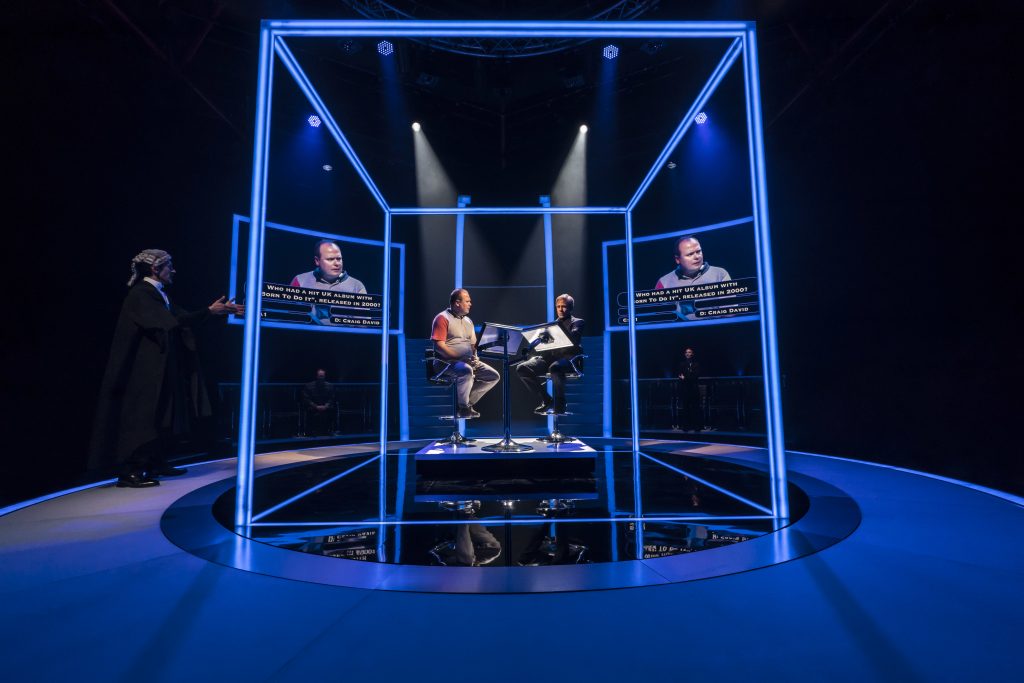[usr=3]
Click here to see my review of Quiz on YouTube

James Graham’s Comedy Puts The Media On Trial
When you watch one of my reviews on YouTube, is how I look the main thing you remember? Does my actual review only account for 7% of the impression I make on you?
According to Quiz, that’s what MPs were told when parliament was first televised. Television, it argues, blurs appearance and reality because it’s a visual medium and an entertainment medium. The assertion that in today’s world image is more important than facts runs through James Graham’s latest play which has opened in Chichester’s Minerva Theatre and may well follow This House, Ink and Labour of Love into the West End.
In Quiz, we learn about the history of popular ITV quizzes and their connection to the commercial nature of the channel thence to Who Wants To Be A Millionaire via pub quizzes throwing in along the way the televising of parliament and the way the dangers of news becoming entertainment.
These many facts sprinkled throughout the evening distract from what is at heart an amusing, interesting story about the trial of Charles and Diana Ingram and one other for defrauding the makers of Who Wants To Be A Millionaire of a million pounds.
The trial wasn’t televised but Quiz is a warning about what might happen if courts cases were on TV. Television is a visual medium that values appearance above facts and entertainment over reality. And, appearances are deceptive.
The quiz show gives the appearance of being fair but may not be. Major Ingram appears to have cheated but maybe he didn’t.
Gavin Spokes and Stephanie Street are splendid
Gavin Spokes and Stephanie Street as the Ingrams did a splendid job of keeping us guessing as to what was appearance and what was true. Were they more clever than they appeared to be or more stupid?
Keir Charles provided excellent impressions of an unctuous Chris Tarrant and numerous other game show hosts.
Just as politics and the news (and by extension, because of social media, many people’s whole lives) are said to have become entertainment, the trial is turned into a show. It is presented as a two act theatrical entertainment with act one delivering the case for the prosecution and act two the defence. Laying it on thicker, Daniel Evans‘ production is also set in a TV quiz show studio. Nearly everything on stage is filmed and shown on monitors. We were even given Millionaire style voting buttons on which we can say whether we think the defendants are guilty or not guilty.
If placing much of the action inside a cubic frame that blocked one’s view was meant to have a Brecht-style alienating effect, the production succeeded too well. I simply saw it as a gimmicky production that added to the bewilderment I was already feeling from being bombarded with so many facts (or fictions) about television.
As a result, it is hard to get involved in the characters as real people or the story or the interesting issue of television blurring image and reality.
James Graham has had a series of winners with Our House, Ink and Labour of Love. Daniel Evans has put on a victorious first season at Chichester. Neither of them have hit the jackpot with Quiz, but that’s entertainment.
Further thoughts on Quiz
Quiz is a warning against televising one of the last parts of public life that is still not filmed, arguing that the media will turn justice into entertainment. Whether it makes a convincing case, I am unsure.
The trial of the ‘coughing Major’ inevitably excited the media in the way that most don’t because it involved a hugely popular TV programme and massive amount of money. Making it carry the burden of showing that television turns everything into entertainment is asking too much of it.
Courts are already a form of theatre in which judges and advocates play to their audience. Juries have a tendency to decide verdicts on appearances rather than evidence whether cameras are present or not.
I don’t believe television has made as much difference to politics as James Graham thinks. It seems to me politicians were aware of the importance of image long before the televising of parliament: Harold Wilson put a pipe in his mouth for public appearances; President Roosevelt made sure he wasn’t seen in his wheelchair. In fact, leaders have been image conscious for centuries as evidenced by the work of Holbein, Van Dyck and others.
The news media have been inventing stories for most of their existence. Hollywood decided early on to encourage media interest in the lives of their actors, thus making their often fictional offscreen lives an extension of the onscreen entertainment.